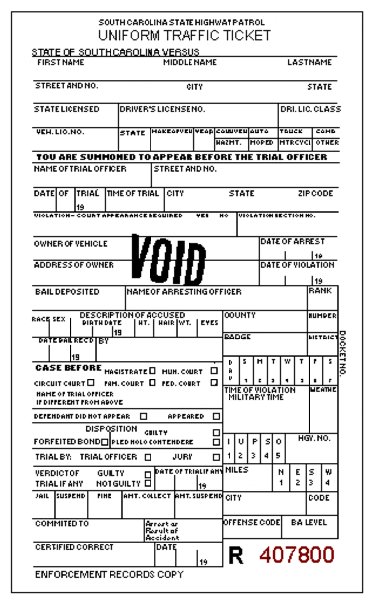
031995
October 16, 1995
MEMORANDUM
| TO: | Magistrates and Municipal Judges All Sheriffs |
| FROM: | Derrick K. McFarland, Staff Attorney |
| RE: | Procedure for Signing Off Tickets |
I have been asked to remind magistrates and municipal judges of the proper procedure for signing off traffic tickets.
When an officer turns over tickets and bond money to a judge, the judge should indicate receipt of this money in two ways:
(1) In roughly the middle of the traffic ticket, on the left side, there is a block marked "BAIL DEPOSITED." (2) This space is to be filled out by the patrolman if he received cash from the motorist. Below this block is another block marked "Date Bail Received," and beside that, "By ." These blocks are to be filled out by the judge at the time the officer turns over the bond money.
(2) In addition to filling in these spaces in the ticket, the court should issue a numbered uniform receipt to the law enforcement officer indicating on the back of the receipt the tickets for which money is being accepted, and the amount of money for each ticket.
On the date set for trial, all cases should be disposed of, unless a jury trial has been requested, a continuance granted, or a change of venue requested. Traffic cases can be disposed by a bond forfeiture (if bond was posted prior to trial), a plea of guilty or nolo contendere, or by trial, either in the defendant's absence, or with him present. Once a disposition is made of a case, the ticket must be signed off on that date, so that it can be transmitted to the Department of Highways and Public Transportation, and points, if any, can be assessed against the driver's license.
Tickets should be signed off at the time of disposition, whether or not the court has received any fine which may have been imposed. If the case involves a courtesy summons issued to a South Carolina driver, or a driver from any state which is a member of the Non-Resident Violator Compact for an offense which is covered by the Compact, the defendant may be tried in his absence. If the defendant is found guilty at the trial in his absence, the ticket should indicate:
(1) that the defendant did not appear;
(2) that the trial was held before the trial officer, and
(3) that the verdict of the trial was "guilty."
The fine of the court should be indicated in the block marked "FINE." The block marked "AMOUNT COLLECTED" is to be marked "NRVC," to indicate that the Compact procedures are being used to enforce the ticket. The same entry can be made in the docket book at the time the money is received, with a reference back to the original trial date and ticket number or docket number.
If a fine is imposed, but no money is received due to the fact that the defendant is indigent, and a scheduled time payment is arranged pursuant to S.C. Code Ann. § 17-25-350, this is indicated in the block marked "AMOUNT COLLECTED." This block is marked "STP" for "scheduled time payment." The particular arrangements can be indicated in the docket book. Therefore, for uniformity in the completion of traffic tickets, the following abbreviations should appear in the "AMOUNT COLLECTED" block; when appropriate:
"STP" for "scheduled time payment"
"NRVC" for "Non-Resident Violator Compact"
Because uniform traffic tickets are the charging documents in many cases, and the "sign-off" is the record of the judgment, it is necessary that certain safeguards be followed to insure the accuracy of these records. These safeguards which you are required to follow were set forth by Order of the Chief Justice dated July 10, 1986. Briefly stated:
1. You must personally sign off traffic tickets; or,
2. You may designate a person to sign off tickets for you, PROVIDED:
(a) the designated person is under your direct supervision and control; and,
(b) the designated person is not associated with the parties in the case; and,
(c) your signature is affixed (3) by the designated person(1) in your presence; and,
(2) over specific papers; and,
(3) in the specific manner in which you directly authorize for that particular case.
Since you are responsible for the manner in which traffic tickets are signed off and the sign off is always in your name, I would strongly recommend that any person signing off tickets on your behalf place his or her initials after your affixed name.
I would remind you that you may not designate another person to sign your name to arrest, bench or search warrants. You must personally sign these documents. If you have any questions, please do not hesitate to call this office.
Editor's Note: In the Matter of Lexington County Magistrate, Op. No. 24946 (S.C. Sup. Ct. filed June 1, 1999) (Shearouse Adv. Sh. No. 19 at 9). Magistrate received a public reprimand by the Supreme Court for allowing a person to sign off a uniform traffic ticket when the magistrate was not present. Such action was in violation of South Carolina Supreme Court Order dated July 10, 1986 (by signing a uniform traffic ticket, magistrates certify the accuracy of the disposition; a person designated by the judge may affix the judge's signature to the certificate, "provided that the person is under direct supervision and control by the judge" and that the signature is affixed in the judge's presence).
SAMPLE TICKET

EXAMPLE 1. Judge James H. Wilson, Secretary Sallie B. Smith. Ticket signed off by Ms. Smith at Judge Wilson's direction and in his presence.
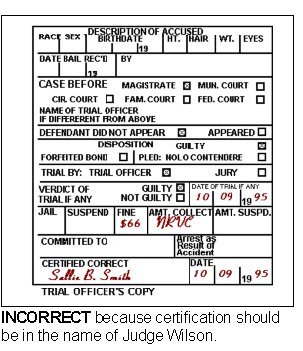 |
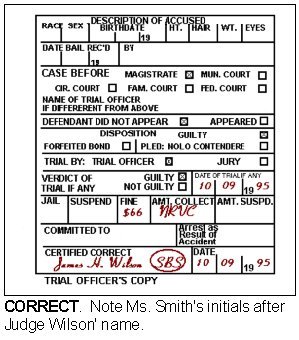 |
EXAMPLE 2. Judge James H. Wilson, Secretary Sallie B. Smith. Trooper W. Smoak made the case.
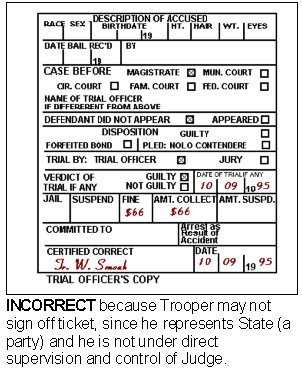 |
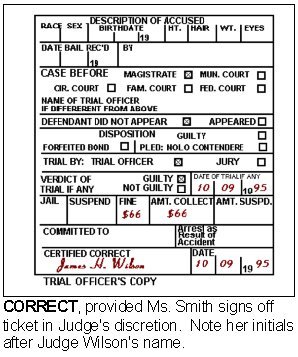 |
EXAMPLE 3. NRVC. Defendant failed to appear, and failed to send money.
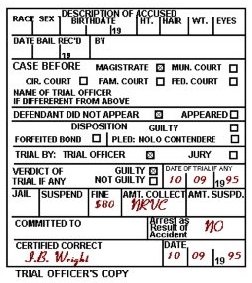
EXAMPLE 4. Bench Warrant issued and the defendant failed to appear and the offense can NOT be signed off under the NRVC Compact.
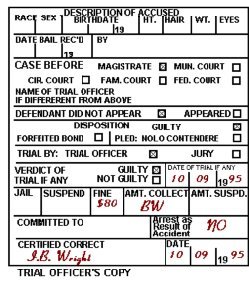
EXAMPLE 5. Defendant did not appear but Forfeited Bond that he had mailed in or given to the officer.
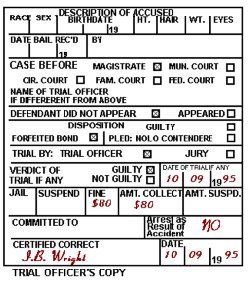
EXAMPLE 6. Pled guilty and Magistrate suspended part of the fine.
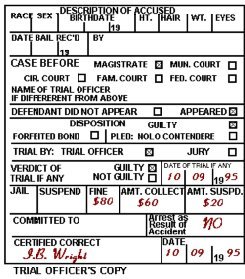
EXAMPLE 7. Trial in Absence by Magistrate. Bond previously received.
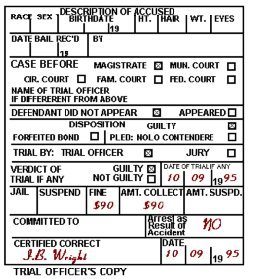
EXAMPLE 8. Scheduled Time Payment. Defendant pled guilty and asked for extra time to pay the fine.
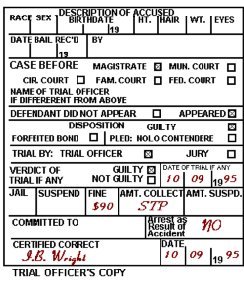
EXAMPLE 9. Jury trial. Jail time given.
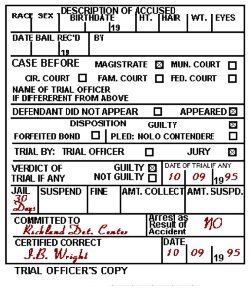
EXAMPLE 10. Jury trial. Not guilty.
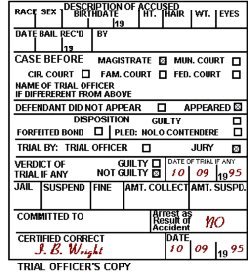
2. A sample ticket is included at the end of this memo.
3. Your signature may be written by hand, or printed, or stamped, or typewritten by the designated person affixing your signature as the sign off to the ticket.